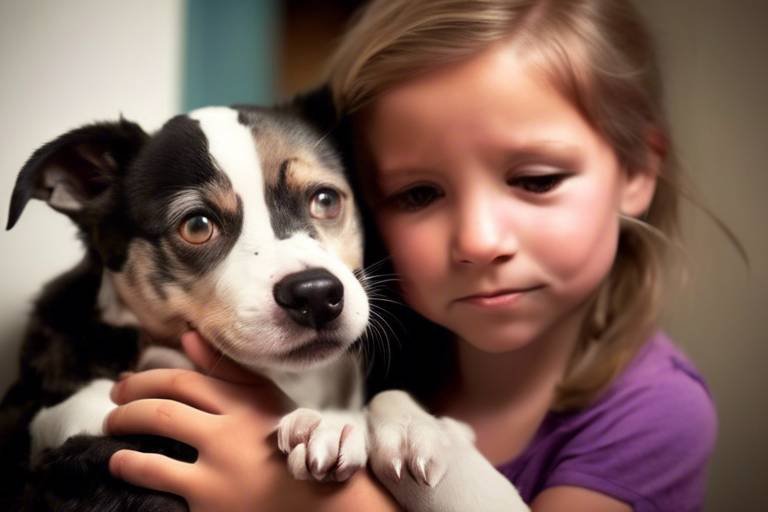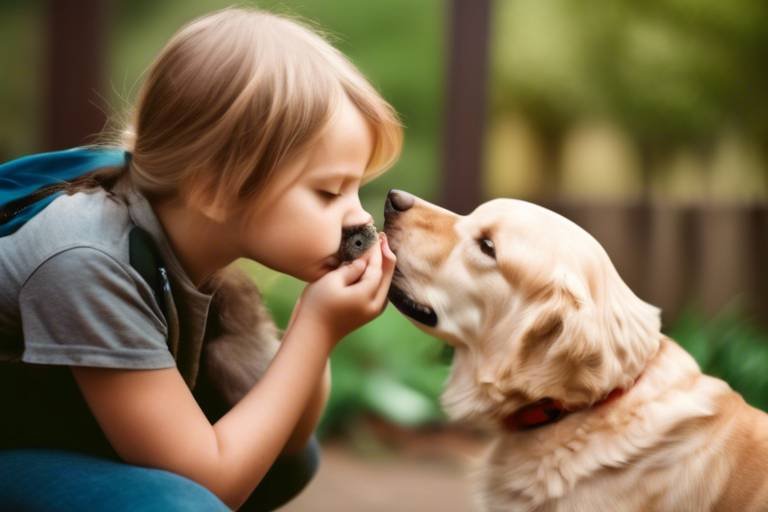The Benefits of Pet Adoption for Single Parents
Adopting a pet can be a life-changing decision, especially for single parents navigating the complexities of raising children alone. The journey of parenthood is often filled with challenges, but bringing a furry friend into the home can transform the family dynamic in incredible ways. Pets are not just animals; they are companions, teachers, and sources of joy that can enhance the lives of single parents and their children. In this article, we will explore the numerous advantages of pet adoption, including the emotional support they provide, the companionship they offer to children, the encouragement of physical activity, and the valuable life lessons they impart.
Adopting a pet provides single parents with unconditional love and emotional support, helping to alleviate feelings of loneliness and stress in their daily lives. Imagine coming home after a long day; the moment you step through the door, your loyal dog greets you with wagging tails and excited barks. This simple act can instantly lift your spirits and remind you that you are not alone. Pets have an innate ability to sense our emotions, often providing comfort during tough times. For single parents, this bond can be particularly significant, as it fosters a sense of connection and reduces feelings of isolation.
Pets can serve as loyal companions for children, teaching them responsibility, empathy, and nurturing skills while providing a sense of security and friendship. When children interact with pets, they learn valuable lessons about caring for another living being. This relationship can be incredibly enriching, as it helps them develop a strong sense of empathy. For instance, when a child feeds their pet or takes it for a walk, they are not just completing a task; they are learning about the importance of caring for others.
Having a pet encourages children to take on responsibilities, such as feeding and walking, which can foster a sense of accountability and maturity. Just think about it: when a child knows they are responsible for a pet’s well-being, they learn to prioritize and manage their time effectively. This newfound sense of responsibility can translate into other areas of their lives, from schoolwork to personal relationships.
Incorporating pet care into daily routines helps children learn the importance of consistency and commitment, valuable life skills that extend beyond pet ownership. For example, establishing a set time for feeding or walking the pet can teach children about the significance of routine and reliability. These lessons are essential as they grow and encounter more responsibilities in life.
Caring for a pet can promote emotional growth in children, helping them to understand and express their feelings while developing strong bonds with their furry friends. The process of nurturing a pet can teach children about love, compassion, and even grief when faced with the realities of a pet's life cycle. Through these experiences, children learn to navigate their emotions in a safe and supportive environment.
Pets can facilitate social interactions for both single parents and children, providing opportunities to meet new people through pet-related activities and community events. For instance, taking a dog to the park can lead to conversations with fellow dog owners, fostering new friendships for both parents and kids. This social aspect can be crucial for single parents who may feel isolated in their parenting journey.
Adopting a pet encourages single parents and their children to engage in regular physical activity, promoting a healthier lifestyle through daily walks and playtime. Pets are natural motivators; they need exercise, which means their owners do too! Whether it’s a game of fetch in the backyard or a brisk walk around the neighborhood, pets get their families moving and active.
Pets inspire families to spend more time outdoors, which can improve overall well-being and foster a love for nature and physical exercise. Imagine the joy of watching your child run freely in the park, a dog bounding alongside them, both filled with pure happiness. This kind of outdoor play is not only good for physical health but also for mental well-being, as it reduces stress and promotes a positive mood.
Incorporating pets into family life helps combat sedentary behaviors, encouraging active play and reducing screen time for both parents and children. Instead of spending hours in front of a screen, families can engage in interactive play with their pets, creating lasting memories and improving their overall health.
Pet adoption provides single parents and their children with valuable life lessons about love, loss, and responsibility, enriching their emotional and social development. These lessons are not just about caring for a pet; they extend into everyday life, shaping how children view relationships and responsibilities.
Owning a pet teaches children the importance of commitment, as caring for an animal requires ongoing attention and dedication throughout its life. This lesson is crucial as children learn that love and care are not just fleeting feelings; they require consistent effort and dedication.
Experiencing the loss of a pet can be a profound lesson in grief, helping children learn to cope with difficult emotions and understand the cycle of life. While it’s a painful experience, it also equips them with the tools to handle loss in other areas of life, making them more resilient and empathetic individuals.
- How can I choose the right pet for my family? Consider your lifestyle, space, and the age of your children to find a pet that fits your family's needs.
- What are the costs associated with pet ownership? Pets require food, veterinary care, grooming, and other supplies, so it's important to budget accordingly.
- Can pets help with my child's anxiety? Yes, many studies show that pets can provide emotional support and reduce anxiety levels in children.

Emotional Support
Adopting a pet can be a transformative experience, especially for single parents navigating the complexities of daily life. Imagine coming home after a long day, feeling the weight of the world on your shoulders, only to be greeted by a wagging tail or a gentle purr. This unconditional love from a pet can provide a sense of comfort that’s hard to find elsewhere. The emotional support that pets offer is profound; they don't just listen—they understand. They sense when you're feeling down and instinctively curl up beside you, offering warmth and companionship that can alleviate feelings of loneliness and stress.
Research shows that pets can significantly reduce feelings of anxiety and depression. Simply petting a dog or cat can release endorphins, those feel-good hormones that help lift your spirits. For single parents, who often juggle multiple responsibilities, having a furry friend can create a sense of stability in their lives. It's like having a partner who is always there, ready to offer a comforting nuzzle or a playful distraction when the going gets tough.
Moreover, pets can serve as a bridge for emotional expression. For children, a pet can be a confidant, a silent listener to their joys and woes. This bond fosters a safe space where children can express their feelings freely. They learn to articulate their emotions better, understanding that it’s okay to feel sad, happy, or even frustrated. In this way, pets not only provide emotional support to single parents but also enrich their children's emotional intelligence.
Here are some key emotional benefits of pet adoption for single parents:
- Stress Relief: The presence of a pet can lower cortisol levels, which helps in reducing stress.
- Increased Happiness: Engaging with pets can boost serotonin and dopamine levels, promoting feelings of happiness.
- Enhanced Social Interaction: Pets can create opportunities for socializing, whether at the dog park or through community events.
In summary, the emotional support that pets provide is invaluable. They not only help single parents cope with the pressures of their daily lives but also contribute to a nurturing environment for their children. Adopting a pet is not just about bringing home an animal; it's about inviting a source of love, joy, and emotional growth into your family.

Companionship for Children
This article explores the numerous advantages of pet adoption for single parents, including companionship, emotional support, and the positive impact on children’s development and well-being.
Adopting a pet provides single parents with unconditional love and emotional support, helping to alleviate feelings of loneliness and stress in their daily lives.
When single parents adopt a pet, they are not just bringing a furry friend into their home; they are also enriching their children's lives in ways that go beyond mere companionship. Pets can serve as loyal companions for children, acting as a bridge to teach them valuable life skills. Imagine your child, after a long day at school, coming home to a wagging tail or a soft purr. This simple act of greeting can ignite feelings of joy and security, providing a sense of stability in their lives.
Moreover, pets can be the perfect teachers of responsibility and empathy. Children learn to care for their pets, which includes feeding, grooming, and exercising them. These tasks are not just chores; they are lessons in accountability. For instance, when a child takes on the responsibility of walking their dog, they learn that their actions directly impact another living being. This can foster a sense of maturity that is essential as they grow.
Having a pet encourages children to take on responsibilities, such as feeding and walking, which can foster a sense of accountability and maturity. The act of caring for a pet can be compared to tending to a garden; both require attention, love, and a commitment to nurturing life. Children who engage in these activities often develop a greater understanding of the importance of being reliable and dependable.
Incorporating pet care into daily routines helps children learn the importance of consistency and commitment, valuable life skills that extend beyond pet ownership. Just like brushing your teeth or doing homework, taking care of a pet becomes part of the rhythm of daily life. This routine not only instills discipline but also teaches children the significance of following through on commitments.
Caring for a pet can promote emotional growth in children, helping them to understand and express their feelings while developing strong bonds with their furry friends. When a child strokes a cat or plays fetch with a dog, they engage in a form of communication that transcends words. This interaction can help children articulate their emotions and develop a deeper understanding of others' feelings, paving the way for stronger social connections.
Pets can facilitate social interactions for both single parents and children, providing opportunities to meet new people through pet-related activities and community events. Whether it’s a local dog park or a pet adoption fair, these environments create a space for families to connect with others who share similar interests. This not only broadens their social circle but also fosters a sense of community.
Adopting a pet encourages single parents and their children to engage in regular physical activity, promoting a healthier lifestyle through daily walks and playtime.
Pets inspire families to spend more time outdoors, which can improve overall well-being and foster a love for nature and physical exercise.
Incorporating pets into family life helps combat sedentary behaviors, encouraging active play and reducing screen time for both parents and children.
Pet adoption provides single parents and their children with valuable life lessons about love, loss, and responsibility, enriching their emotional and social development.
Owning a pet teaches children the importance of commitment, as caring for an animal requires ongoing attention and dedication throughout its life.
Experiencing the loss of a pet can be a profound lesson in grief, helping children learn to cope with difficult emotions and understand the cycle of life.
- What types of pets are best for single parents? Dogs and cats are popular choices, but smaller pets like rabbits or guinea pigs can also be great companions.
- How can pets help with children's emotional development? Pets provide unconditional love and companionship, helping children learn to express and manage their emotions.
- Are there any challenges to pet adoption for single parents? Yes, single parents may face time constraints, but the benefits often outweigh the challenges.
- What should I consider before adopting a pet? Consider your lifestyle, the time you can dedicate to a pet, and the type of pet that would best fit your family.
Building Responsibility
Having a pet is like welcoming a new family member into your home, and it comes with a bundle of responsibilities that can significantly shape a child's character. When single parents adopt a pet, they not only gain a loyal companion but also an opportunity to teach their children about responsibility. This can be a transformative experience for kids, as it encourages them to engage in tasks that require consistent effort and care. For instance, children can help with daily chores such as feeding, grooming, and exercising their furry friends. These activities instill a sense of accountability that is crucial for their development.
Moreover, taking care of a pet can serve as a practical lesson in time management. Children learn to allocate time for their pet’s needs amidst their schoolwork and playtime. This balance is essential as it mirrors the real-world responsibilities they will face as they grow older. It’s not just about feeding the pet; it’s about understanding that their actions directly affect another living being. This realization can be eye-opening and can lead to a deeper understanding of how their choices impact those around them.
To further illustrate, let’s consider some specific responsibilities that children can take on:
- Feeding: Children can be responsible for measuring out the food and ensuring their pet is fed at the same time each day.
- Walking: Taking the dog for walks not only keeps the pet healthy but also encourages children to get outside and be active.
- Grooming: Regular brushing and bathing can teach children about hygiene and the importance of caring for others.
- Training: Teaching a pet basic commands can foster patience and communication skills.
These responsibilities may seem small, but they lay the foundation for a strong sense of duty. Children learn that their pets rely on them for care and companionship, which can be a powerful motivator to fulfill their obligations. Over time, these lessons translate into greater confidence and maturity. When children see their pets thriving under their care, it reinforces the idea that they can make a positive impact in the world, which is a valuable lesson that extends far beyond pet ownership.
In conclusion, adopting a pet is not just about companionship; it’s a journey that teaches children the essence of responsibility. By engaging in pet care, kids learn vital life skills that prepare them for the future, making them more empathetic and responsible individuals. So, if you’re a single parent considering pet adoption, remember that you’re not just changing an animal’s life; you’re enriching your child’s life in ways you might not even realize.
Q: What age is appropriate for children to start taking care of a pet?
A: Generally, children can start taking on pet care responsibilities around the age of 6, but this can vary based on the child's maturity and the type of pet.
Q: How can I ensure my child is responsible with a pet?
A: Start with small tasks and gradually increase their responsibilities as they demonstrate reliability. Supervise them initially to provide guidance and support.
Q: What if my child loses interest in taking care of the pet?
A: It’s essential to keep the pet care routine engaging. You can involve your child in fun activities with the pet, such as training sessions or outdoor adventures, to rekindle their interest.
Daily Routines
This article explores the numerous advantages of pet adoption for single parents, including companionship, emotional support, and the positive impact on children’s development and well-being.
Adopting a pet provides single parents with unconditional love and emotional support, helping to alleviate feelings of loneliness and stress in their daily lives.
Pets can serve as loyal companions for children, teaching them responsibility, empathy, and nurturing skills while providing a sense of security and friendship.
Having a pet encourages children to take on responsibilities, such as feeding and walking, which can foster a sense of accountability and maturity.
Incorporating pet care into daily routines can be a game-changer for single parents and their kids. Think about it: when you have a furry friend waiting for their breakfast, it naturally creates a rhythm in your household. Imagine starting your day with a wagging tail or a gentle purr. This simple act of caring for a pet can instill a sense of discipline in children. They learn that certain tasks need to be done at specific times, like feeding the dog at 8 AM or taking the cat for a stroll in the evening.
Moreover, these routines can be structured to include the entire family, making pet care a bonding activity. For instance, you might set up a schedule that looks something like this:
| Task | Responsible Person | Frequency |
|---|---|---|
| Feeding | Child 1 | Twice a day |
| Walking | Parent | Daily |
| Grooming | Child 2 | Weekly |
| Vet Visits | Parent | As needed |
This table not only provides clarity but also helps children understand their roles within the family unit. It’s a great way to teach them that everyone has responsibilities, and teamwork makes the dream work! Plus, as they check off tasks from their list, they experience a sense of achievement that boosts their self-esteem.
Incorporating pet care into daily routines helps children learn the importance of consistency and commitment, valuable life skills that extend beyond pet ownership. They begin to understand that pets rely on them for their well-being, which mirrors the responsibilities they will face in other areas of life, whether it’s homework, chores, or friendships. This nurturing environment fosters emotional growth and resilience, preparing them for the ups and downs of life.
Caring for a pet can promote emotional growth in children, helping them to understand and express their feelings while developing strong bonds with their furry friends.
Pets can facilitate social interactions for both single parents and children, providing opportunities to meet new people through pet-related activities and community events.
Adopting a pet encourages single parents and their children to engage in regular physical activity, promoting a healthier lifestyle through daily walks and playtime.
Pets inspire families to spend more time outdoors, which can improve overall well-being and foster a love for nature and physical exercise.
Incorporating pets into family life helps combat sedentary behaviors, encouraging active play and reducing screen time for both parents and children.
Pet adoption provides single parents and their children with valuable life lessons about love, loss, and responsibility, enriching their emotional and social development.
Owning a pet teaches children the importance of commitment, as caring for an animal requires ongoing attention and dedication throughout its life.
Experiencing the loss of a pet can be a profound lesson in grief, helping children learn to cope with difficult emotions and understand the cycle of life.
- What are the best pets for single parents?
While it depends on personal preference, dogs and cats are popular choices due to their companionship. Smaller pets like hamsters or fish can also be great for families with younger children.
- How can I involve my children in pet care?
Assign age-appropriate tasks such as feeding, grooming, and walking the pet to instill a sense of responsibility and teamwork.
- What are the emotional benefits of having a pet?
Pets provide companionship, reduce feelings of loneliness, and can improve overall mental health for both parents and children.
Emotional Growth
This article explores the numerous advantages of pet adoption for single parents, including companionship, emotional support, and the positive impact on children’s development and well-being.
Adopting a pet provides single parents with unconditional love and emotional support, helping to alleviate feelings of loneliness and stress in their daily lives.
Pets can serve as loyal companions for children, teaching them responsibility, empathy, and nurturing skills while providing a sense of security and friendship.
Having a pet encourages children to take on responsibilities, such as feeding and walking, which can foster a sense of accountability and maturity.
Incorporating pet care into daily routines helps children learn the importance of consistency and commitment, valuable life skills that extend beyond pet ownership.
When children care for a pet, they embark on a journey of that can be both profound and transformative. This bond with a furry friend allows them to experience a range of feelings—love, joy, and even sadness—which are essential for their emotional development. For instance, pets can help children understand and express their emotions in a safe environment. They learn to recognize when their pet is happy or sad, which mirrors their own feelings. This connection fosters empathy, as children become attuned to the needs and emotions of another being.
Moreover, the act of caring for a pet teaches children about responsibility and commitment. They quickly realize that their pet relies on them for food, exercise, and companionship. This realization can lead to a sense of pride and accomplishment, boosting their self-esteem. As they navigate the ups and downs of pet ownership—like dealing with a pet's illness or celebrating its milestones—they cultivate resilience and emotional intelligence. These lessons are invaluable, as they prepare children for the complexities of human relationships and the emotional challenges that life may throw their way.
In essence, the emotional growth that stems from pet adoption is not just about the bond formed with the animal; it's about the life skills and emotional maturity that children gain along the way. They learn to navigate their feelings, understand the importance of caring for others, and develop a deeper connection to the world around them.
Pets can facilitate social interactions for both single parents and children, providing opportunities to meet new people through pet-related activities and community events.
Adopting a pet encourages single parents and their children to engage in regular physical activity, promoting a healthier lifestyle through daily walks and playtime.
Pets inspire families to spend more time outdoors, which can improve overall well-being and foster a love for nature and physical exercise.
Incorporating pets into family life helps combat sedentary behaviors, encouraging active play and reducing screen time for both parents and children.
Pet adoption provides single parents and their children with valuable life lessons about love, loss, and responsibility, enriching their emotional and social development.
Owning a pet teaches children the importance of commitment, as caring for an animal requires ongoing attention and dedication throughout its life.
Experiencing the loss of a pet can be a profound lesson in grief, helping children learn to cope with difficult emotions and understand the cycle of life.
- What types of pets are best for single parents?
While dogs and cats are popular choices, smaller pets like rabbits or guinea pigs can also be great companions, depending on the family's lifestyle.
- How can a pet help with my child's emotional development?
Pets provide unconditional love, teach empathy, and help children navigate their emotions through the bond they share.
- What responsibilities should children have when caring for a pet?
Children can help with feeding, grooming, walking, and cleaning up after their pets, which fosters a sense of responsibility.
- Can adopting a pet improve my mental health as a single parent?
Absolutely! Pets can alleviate feelings of loneliness and provide companionship, which can significantly boost your mental well-being.
Social Interaction
When it comes to social interaction, adopting a pet can be a game changer for single parents and their children. Pets have a magical way of breaking down barriers and bringing people together. Imagine walking your dog in the park; it’s not just a stroll—it’s an opportunity to meet fellow dog lovers, share stories, and even make new friends. Pets serve as a common ground, a conversation starter that can lead to meaningful connections. The simple act of holding a leash can transform a solitary outing into a lively social event.
Moreover, pet adoption opens up a world of community activities and events that are centered around our furry companions. Think about dog training classes, pet-friendly community fairs, or even local adoption drives. These gatherings provide the perfect setting for single parents and their kids to meet others who share similar interests. Engaging in these activities not only enhances social skills but also fosters a sense of belonging. It’s like being part of a secret club where the only requirement is love for animals!
Additionally, pets can help children develop social skills that are crucial for their growth. For instance, when kids interact with their pets, they learn to communicate effectively, understand non-verbal cues, and develop empathy. These skills translate into their interactions with peers, making them more confident and socially adept. It’s fascinating to see how a simple act of petting a cat or playing fetch with a dog can teach valuable lessons about patience, kindness, and cooperation.
In essence, the social benefits of pet adoption extend beyond just the family unit. They create opportunities for single parents and their children to engage with the community, build friendships, and enhance their social lives. So, if you’re a single parent considering pet adoption, remember that you’re not just bringing home a new family member; you’re also opening the door to a vibrant social network!
- What are the best pets for single parents? While dogs and cats are popular, consider smaller pets like rabbits or guinea pigs if space or time is limited.
- How can pets help with my child's social skills? Pets encourage children to communicate and interact with others, helping them develop empathy and social understanding.
- Are there community events for pet owners? Yes! Many communities host pet fairs, training classes, and adoption events that are great for socializing.
- What if my child is allergic to pets? There are hypoallergenic breeds available, or consider pets like fish or reptiles that don’t trigger allergies.

Physical Activity
This article explores the numerous advantages of pet adoption for single parents, including companionship, emotional support, and the positive impact on children’s development and well-being.
Adopting a pet provides single parents with unconditional love and emotional support, helping to alleviate feelings of loneliness and stress in their daily lives.
Pets can serve as loyal companions for children, teaching them responsibility, empathy, and nurturing skills while providing a sense of security and friendship.
Having a pet encourages children to take on responsibilities, such as feeding and walking, which can foster a sense of accountability and maturity.
Incorporating pet care into daily routines helps children learn the importance of consistency and commitment, valuable life skills that extend beyond pet ownership.
Caring for a pet can promote emotional growth in children, helping them to understand and express their feelings while developing strong bonds with their furry friends.
Pets can facilitate social interactions for both single parents and children, providing opportunities to meet new people through pet-related activities and community events.
Adopting a pet encourages single parents and their children to engage in regular physical activity, promoting a healthier lifestyle through daily walks and playtime. Imagine the joy of watching your child run around the yard, laughter echoing as they play fetch with their dog. This kind of interaction not only strengthens the bond between the pet and the family but also contributes significantly to physical health. Studies have shown that families with pets tend to be more active, leading to a decrease in obesity rates and an increase in overall well-being.
Moreover, pets can be excellent motivators for physical activity. For instance, dogs need to be walked, which means that single parents often find themselves out and about, breathing in fresh air and soaking up sunlight. This daily ritual can become a cherished family time, where everyone participates in the joy of exercise. Consider these points:
- Daily Walks: Regular walks with pets can help establish a routine that encourages everyone to stay active.
- Playtime: Engaging in active play with pets, such as throwing a ball or playing tug-of-war, provides an excellent workout.
- Outdoor Adventures: Pets can inspire families to explore parks, trails, and other outdoor spaces, fostering a love for nature.
Incorporating pets into family life helps combat sedentary behaviors, encouraging active play and reducing screen time for both parents and children. It’s like having a built-in exercise buddy who never complains and always wants to play! This not only benefits physical health but also enhances mental well-being, as physical activity is known to reduce stress and anxiety. So, if you're thinking about adopting a pet, remember that it's not just a furry friend—it's a ticket to a more active and fulfilling lifestyle for you and your children.
Pet adoption provides single parents and their children with valuable life lessons about love, loss, and responsibility, enriching their emotional and social development.
Owning a pet teaches children the importance of commitment, as caring for an animal requires ongoing attention and dedication throughout its life.
Experiencing the loss of a pet can be a profound lesson in grief, helping children learn to cope with difficult emotions and understand the cycle of life.
- What are the best pets for single parents?
Dogs and cats are popular choices, but smaller pets like rabbits or guinea pigs can also be great companions. - How much time do I need to dedicate to a pet?
It varies by pet, but generally, dogs require more time for walks and play than cats or small animals. - Can pets help with my child's emotional development?
Absolutely! Pets can provide comfort and help children learn empathy and responsibility. - What if my child is allergic to pets?
Consider hypoallergenic breeds or smaller pets that may trigger fewer allergies.
Encouraging Outdoor Play
This article explores the numerous advantages of pet adoption for single parents, including companionship, emotional support, and the positive impact on children’s development and well-being.
Adopting a pet provides single parents with unconditional love and emotional support, helping to alleviate feelings of loneliness and stress in their daily lives.
Pets can serve as loyal companions for children, teaching them responsibility, empathy, and nurturing skills while providing a sense of security and friendship.
Having a pet encourages children to take on responsibilities, such as feeding and walking, which can foster a sense of accountability and maturity.
Incorporating pet care into daily routines helps children learn the importance of consistency and commitment, valuable life skills that extend beyond pet ownership.
Caring for a pet can promote emotional growth in children, helping them to understand and express their feelings while developing strong bonds with their furry friends.
Pets can facilitate social interactions for both single parents and children, providing opportunities to meet new people through pet-related activities and community events.
Adopting a pet encourages single parents and their children to engage in regular physical activity, promoting a healthier lifestyle through daily walks and playtime.
When a family brings a pet into their home, it often opens the door to a world of outdoor adventures. Pets, especially dogs, are natural motivators for getting outside and moving. Imagine a sunny afternoon where a child throws a ball in the park, laughter echoing as the dog bounds after it, tail wagging with joy. This simple act of playing fetch not only strengthens the bond between the child and the pet but also encourages a love for outdoor play.
Engaging in outdoor activities with pets can significantly improve physical health. For instance, regular walks can help both parents and children stay active, reducing the risk of obesity and promoting cardiovascular health. According to a study, families with pets tend to be more active, with pet owners walking an average of 30 minutes more each week compared to non-pet owners. This time spent outdoors can lead to:
- Increased Vitamin D levels from sunlight exposure
- Improved mood and mental health through physical activity
- Opportunities for family bonding and teamwork during playtime
Moreover, outdoor play with pets can also spark a sense of adventure and curiosity in children. Exploring parks, hiking trails, or even just the neighborhood can turn into exciting expeditions. These experiences not only enhance physical fitness but also foster a deep appreciation for nature and the environment. As children engage with their surroundings, they learn to observe, question, and appreciate the beauty of the world around them.
In essence, pets are not just companions; they are gateways to a more active, playful, and fulfilling outdoor lifestyle for single parents and their children.
Pet adoption provides single parents and their children with valuable life lessons about love, loss, and responsibility, enriching their emotional and social development.
Owning a pet teaches children the importance of commitment, as caring for an animal requires ongoing attention and dedication throughout its life.
Experiencing the loss of a pet can be a profound lesson in grief, helping children learn to cope with difficult emotions and understand the cycle of life.
- How does pet adoption benefit single parents?
Pet adoption provides emotional support, companionship, and promotes a healthier lifestyle through physical activities. - What types of pets are best for single-parent households?
Dogs and cats are popular choices, but smaller pets like rabbits or guinea pigs can also be great companions. - Can pets help improve children's social skills?
Yes, pets can facilitate social interactions and help children develop empathy and communication skills. - How can I encourage my child to take responsibility for a pet?
Assign age-appropriate tasks, such as feeding or walking the pet, and make it a fun routine.
Reducing Sedentary Behavior
This article explores the numerous advantages of pet adoption for single parents, including companionship, emotional support, and the positive impact on children’s development and well-being.
Adopting a pet provides single parents with unconditional love and emotional support, helping to alleviate feelings of loneliness and stress in their daily lives.
Pets can serve as loyal companions for children, teaching them responsibility, empathy, and nurturing skills while providing a sense of security and friendship.
Having a pet encourages children to take on responsibilities, such as feeding and walking, which can foster a sense of accountability and maturity.
Incorporating pet care into daily routines helps children learn the importance of consistency and commitment, valuable life skills that extend beyond pet ownership.
Caring for a pet can promote emotional growth in children, helping them to understand and express their feelings while developing strong bonds with their furry friends.
Pets can facilitate social interactions for both single parents and children, providing opportunities to meet new people through pet-related activities and community events.
Adopting a pet encourages single parents and their children to engage in regular physical activity, promoting a healthier lifestyle through daily walks and playtime.
Pets inspire families to spend more time outdoors, which can improve overall well-being and foster a love for nature and physical exercise.
In today's digital age, it’s all too easy for families to fall into a routine of sedentary behavior, often glued to screens for hours on end. However, bringing a pet into the home can act as a powerful antidote to this issue. Pets, especially dogs, require regular exercise, which naturally encourages families to step outside and get moving. Imagine the joy of tossing a frisbee in the park or going for a brisk walk around the neighborhood. Not only does this promote physical health, but it also creates lasting memories and strengthens family bonds.
Moreover, the presence of a pet can transform mundane activities into fun adventures. For instance, while walking the dog, parents and children can engage in conversations, discover new paths, and even meet neighbors along the way. This simple act of walking becomes a shared experience, enhancing both physical and emotional well-being. To further illustrate the impact, consider these points:
- Increased Activity Levels: Pets motivate families to be more active, reducing the time spent on screens.
- Interactive Play: Engaging in playtime with pets, whether it's fetch or tug-of-war, promotes movement and laughter.
- Routine Establishment: Regular pet care routines encourage children to be active participants in their own health.
Ultimately, adopting a pet not only combats sedentary lifestyles but also fosters a more active, engaged, and healthy family dynamic. It's a win-win situation where both the pet and the family thrive together!
Pet adoption provides single parents and their children with valuable life lessons about love, loss, and responsibility, enriching their emotional and social development.
Owning a pet teaches children the importance of commitment, as caring for an animal requires ongoing attention and dedication throughout its life.
Experiencing the loss of a pet can be a profound lesson in grief, helping children learn to cope with difficult emotions and understand the cycle of life.
Q: What type of pet is best for single parents?
A: The best pet depends on your lifestyle. Dogs require more attention and exercise, while cats are more independent. Consider your daily routine and the time you can dedicate to a pet.
Q: How can pets help with emotional support?
A: Pets offer unconditional love and companionship, which can significantly reduce feelings of loneliness and stress, especially for single parents.
Q: What are some ways pets can promote physical activity?
A: Walking, playing fetch, or even just running around the yard can increase physical activity levels for both parents and children, promoting a healthier lifestyle.
Q: Can pets help children with social skills?
A: Yes! Pets can facilitate social interactions, helping children learn to communicate better and build friendships with others who share a love for animals.

Teaching Life Lessons
Adopting a pet is more than just bringing a furry friend into your home; it's a doorway to valuable life lessons for both single parents and their children. The journey of pet ownership is filled with opportunities to learn about love, responsibility, and even the harsh realities of life. It's akin to having a living, breathing classroom right in your living room. Imagine your child learning not just how to care for another being, but also how to navigate the complexities of emotions—both joyful and sorrowful.
One of the most profound lessons that pet ownership teaches is the importance of commitment. When you adopt a pet, you're not just signing up for cuddles and playtime; you're making a promise to provide care and companionship throughout the animal's life. This ongoing responsibility can instill a sense of accountability in children. They learn that feeding, walking, and grooming a pet are not just chores, but essential parts of ensuring their furry friend is happy and healthy. It’s a bit like planting a seed; with regular care and attention, both the pet and the child grow together, developing a bond that teaches them the essence of loyalty and dedication.
Moreover, the experience of caring for a pet can lead to significant emotional growth. Children learn to recognize and express their feelings as they bond with their pets. For instance, when a child comforts a pet that is scared during a thunderstorm, they are not just calming their companion; they are also learning empathy and compassion. These skills are crucial as they navigate relationships with friends and family. Pets have a unique way of helping children articulate their emotions, often serving as a sounding board for their thoughts and feelings. This emotional connection can be incredibly enriching, providing a safe space for children to explore their feelings without judgment.
However, not all lessons are easy. The reality of pet ownership also includes the inevitability of loss. Experiencing the death of a pet can be one of the hardest lessons for a child. Yet, it can also be one of the most significant. Understanding grief and learning to cope with the loss of a beloved pet teaches children about the cycle of life. They learn that while life is beautiful, it can also be fleeting. This experience can foster resilience, helping them develop coping strategies that will serve them well throughout their lives. Just as a flower blooms and eventually wilts, so do our relationships with the beings we love. Through this lens, children can learn to cherish the moments they have with their pets, understanding that every day is a gift.
In conclusion, pet adoption is not merely about finding a companion; it's about embarking on a journey filled with lessons that shape character and emotional intelligence. The responsibility, emotional connections, and even the heartaches of pet ownership prepare children for the complexities of life. So, if you're a single parent contemplating pet adoption, remember that you're not just welcoming a pet into your home; you're inviting a teacher into your family.
- What are the best pets for single parents?
While dogs and cats are popular choices, consider smaller pets like rabbits or guinea pigs, which may require less time and commitment.
- How can I teach my child to care for a pet?
Start with simple tasks like feeding and grooming, gradually introducing more responsibilities as they become comfortable.
- What if my child is afraid of animals?
Introduce pets gradually and in a safe environment. Encourage them to observe the pet from a distance before engaging.
- How do I handle the loss of a pet with my child?
Be honest and open about the loss. Encourage your child to express their feelings and share memories of the pet.
Understanding Commitment
This article explores the numerous advantages of pet adoption for single parents, including companionship, emotional support, and the positive impact on children’s development and well-being.
Adopting a pet provides single parents with unconditional love and emotional support, helping to alleviate feelings of loneliness and stress in their daily lives.
Pets can serve as loyal companions for children, teaching them responsibility, empathy, and nurturing skills while providing a sense of security and friendship.
Having a pet encourages children to take on responsibilities, such as feeding and walking, which can foster a sense of accountability and maturity.
Incorporating pet care into daily routines helps children learn the importance of consistency and commitment, valuable life skills that extend beyond pet ownership.
Caring for a pet can promote emotional growth in children, helping them to understand and express their feelings while developing strong bonds with their furry friends.
Pets can facilitate social interactions for both single parents and children, providing opportunities to meet new people through pet-related activities and community events.
Adopting a pet encourages single parents and their children to engage in regular physical activity, promoting a healthier lifestyle through daily walks and playtime.
Pets inspire families to spend more time outdoors, which can improve overall well-being and foster a love for nature and physical exercise.
Incorporating pets into family life helps combat sedentary behaviors, encouraging active play and reducing screen time for both parents and children.
Pet adoption provides single parents and their children with valuable life lessons about love, loss, and responsibility, enriching their emotional and social development.
Owning a pet is not just about providing food and shelter; it’s a commitment that lasts for the lifetime of the animal. This commitment teaches children the significance of being responsible for another living being, which can be an eye-opening experience. For instance, when children are involved in the daily care of their pet, they learn that animals depend on them for survival, comfort, and happiness. This sense of duty can be compared to the way a gardener nurtures a plant; it requires regular attention, patience, and love.
Moreover, the lessons learned from pet ownership extend beyond just feeding and walking. Children will discover the importance of consistency, as pets thrive on routine. This can lead to discussions about how commitments in life—like friendships, schoolwork, and even family obligations—require similar dedication. A pet’s needs are not just physical; they also encompass emotional well-being, teaching kids to recognize and respond to the feelings of others, which is crucial in fostering empathy.
In a world where instant gratification is often the norm, having a pet instills the value of long-term commitment. Children learn that caring for a pet is a journey filled with ups and downs, much like any meaningful relationship in life. They will experience the joy of watching their pet grow, but also the challenges that come with it, such as health issues or behavioral problems. These experiences can prepare children for future commitments, whether in friendships or their own families.
In summary, understanding commitment through pet ownership is a multifaceted lesson that provides children with essential skills and perspectives that will serve them well throughout their lives.
- What are the best pets for single parents with children?
Some of the best pets include dogs and cats, as they are typically affectionate and can form strong bonds with children. Small pets like rabbits or guinea pigs can also be great choices for families with limited space.
- How can I prepare my child for pet ownership?
Start by discussing the responsibilities involved in caring for a pet. You can also involve them in volunteering at a local animal shelter to give them a sense of what pet ownership entails.
- How much time should I dedicate to a pet each day?
It depends on the type of pet, but generally, dogs require more time for walks and play, while cats may need less. Aim for at least 30 minutes to an hour of interaction daily.
Dealing with Loss
Experiencing the loss of a pet can be one of the most heart-wrenching moments in a family’s life. For single parents and their children, this event can serve as a profound lesson in grief and emotional resilience. When a beloved furry friend passes away, it’s not just a pet that is lost; it's a companion, a source of joy, and a member of the family. This moment can create a space for parents to guide their children through the complex emotions associated with loss, helping them to process their feelings in a healthy way.
Understanding and dealing with grief can be challenging, especially for children who may not yet have the vocabulary or emotional maturity to articulate their sadness. Here’s where the role of a single parent becomes crucial. By acknowledging the pain and allowing children to express their feelings, parents can help them navigate this difficult journey. It's perfectly normal for kids to feel a whirlwind of emotions—sadness, anger, confusion, and even guilt. Thus, fostering an open dialogue about these feelings can be incredibly beneficial.
One effective way to help children cope with the loss of a pet is to create a memory ritual. This can be as simple as:
- Creating a scrapbook filled with photos and memories of their pet.
- Holding a small memorial ceremony in the backyard or a favorite park.
- Planting a tree or flower in their pet's memory.
These activities not only honor the pet's memory but also provide a constructive outlet for grief, allowing children to celebrate the life that was shared rather than just mourn the loss.
Moreover, it’s essential to teach children about the cycle of life. This can be a delicate topic, but explaining that all living beings have a life span can help them understand that loss is a natural part of existence. Books about loss and grief can also serve as valuable resources to facilitate discussions and provide comfort. Stories can mirror their experiences and help them feel less isolated in their sorrow.
Ultimately, dealing with loss is a journey that requires patience and understanding. Single parents can lead by example, showing their children that it’s okay to grieve and that healing takes time. By fostering an environment where feelings are validated and expressed, parents can equip their children with the emotional tools they need not just to cope with loss, but to grow from it.
- How can I help my child cope with the loss of a pet?
Encourage open conversations about their feelings, create memory rituals, and provide comfort through shared activities. - Is it normal for children to feel guilty after losing a pet?
Yes, it’s common for children to feel guilt. Reassure them that they did their best to care for their pet. - Should I get another pet immediately after losing one?
It’s important to allow time for grieving. Each family’s timeline is different, so wait until everyone feels ready.
Frequently Asked Questions
- What are the emotional benefits of pet adoption for single parents?
Adopting a pet can provide single parents with a source of unconditional love and emotional support. Pets can help alleviate feelings of loneliness and stress, making daily life feel a little less overwhelming. They are always there to lend an ear (or a paw) when you need it the most!
- How do pets help children develop important life skills?
Pets can teach children responsibility, empathy, and nurturing skills. By taking care of a pet, kids learn to be accountable for another living being, which can help them grow into more mature and responsible individuals. It's like having a little practice run for adulthood!
- Can having a pet improve social interactions for single parents and their kids?
Absolutely! Pets often serve as social magnets, helping single parents and their children meet new people through pet-related activities like dog parks, training classes, or community events. It’s a great way to expand your social circle while enjoying quality time with your furry friend!
- What impact does pet adoption have on physical activity levels?
Having a pet encourages families to engage in regular physical activity, like daily walks or playtime in the yard. This not only promotes a healthier lifestyle but also helps combat sedentary behavior, allowing both parents and children to enjoy the great outdoors together.
- What life lessons can children learn from having a pet?
Owning a pet teaches children about commitment and responsibility. They learn that caring for an animal requires ongoing attention and dedication. Additionally, experiencing the loss of a pet can be a profound lesson in grief, helping kids understand and cope with difficult emotions.



















